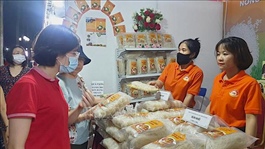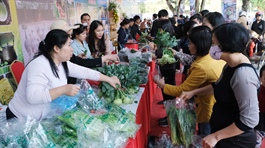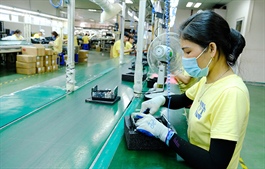Mekong Delta provinces help fruit farmers find markets
Mekong Delta provinces help fruit farmers find markets
Can Tho City and provinces in the Cuu Long (Mekong) Delta are helping farmers find export markets for their fruits to improve their incomes.

According to the Can Tho Department of Agriculture and Rural Development, the city has more than 23,500ha of orchards and an annual output of more than 168,250 tonnes.
Many of the fruits enable farmers to achieve annual incomes of VND200 - VND800 million (US$8.500-34,000) per hectare and even higher.
The fruits grown here are diverse and delicious and include some specialities like durian, breast fruit, longan, orange, grapefruit, and Ha Chau strawberry that fetch high prices.
The city has established many concentrated fruit-growing areas for durian and Ha Chau strawberry in Phong Dien District, longan in O Mon and Thoi Lai districts and mango in Co Do District.
The department has focused on obtaining collective trademarks for various fruits such as mango and longan in Thoi An Ward in O Mon, Ha Chau strawberry in Nhon Ai Commune in Phong Dien and durian in Tan Thoi commune to improve their value and help develop eco-tourism.
Nguyen Van Su, its director, said the agricultural sector was helping farmers develop specialised areas for high-value fruits.
His department was focusing on improving quality, building brands and expanding effective farming models for fruits like durian, breast fruit, longan, and mango.
It had strengthened linkages and co-ordination with businesses to build brands for fruits and enable their processing and preservation.
Thanks to its efforts, the city had successfully exported many fruits to demanding markets, especially Europe.
Long An Province has more than 17,800ha under dragon fruit, mango, watermelon, banana, and lemon.
They include 213 planting areas which have been granted codes for export to markets including Australia, New Zealand, the US, South Korea, and China.
Director of the province Sub-Department of Cultivation, Plant Protection and Quality Control of Agricultural Products, Nguyen Van Cuong, said to properly manage the codes, the province provided training and guidance to farmers and co-operatives.
Besides processing and exporting fresh fruits, local enterprises also make dry fruit, wines, juices, soluble powders, and syrups for domestic sale and export.
In Tien Giang Province, authorities are ready with a programme for the online distribution of agricultural produce.
They already support businesses with market information, export promotion and participation in fairs and conferences to link supply and demand and help them access markets and find partners in those markets.
Le Thanh Tung, deputy director of the Ministry of Agriculture and Rural Development’s Department of Crop Production, said processing capacity remained limited with the country mainly exporting fresh fruits.
In the long term, it was necessary to reorganise production to improve quality, reduce costs, increase deep processing, and expand markets by strengthening linkages between stakeholders in the fruit production chain.



























